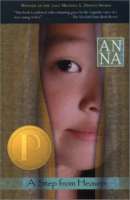by Julia López-Robertson with Amanda Dunnigan & Rebecca Martin
University of South Carolina
 In A Step from Heaven, An Na invites us on the Parks’ journey as a recently arrived Korean family who migrated to the United States (Mi Gook) seeking a better life. Young Ju, our seven year old protagonist, believes that Mi Gook is heaven, but is it? The family’s new life in the United States is full of contradiction and chaos; they desire to belong and fit in while still maintaining their Korean heritage, is this possible? As we continue to serve more immigrant children in our schools, how can we help them cross borders between life inside the home vs. life outside in the world?
In A Step from Heaven, An Na invites us on the Parks’ journey as a recently arrived Korean family who migrated to the United States (Mi Gook) seeking a better life. Young Ju, our seven year old protagonist, believes that Mi Gook is heaven, but is it? The family’s new life in the United States is full of contradiction and chaos; they desire to belong and fit in while still maintaining their Korean heritage, is this possible? As we continue to serve more immigrant children in our schools, how can we help them cross borders between life inside the home vs. life outside in the world?
When Young Ju excitedly tells a friend that her family is moving to Mi Gook, her friend’s response is quite unexpected; “You are moving to Mi Gook and I feel sorry for you because you have to leave everything behind”. Truer words couldn’t be spoken; when immigrants make the decision to move, they certainly are forced to leave everything and everyone they know and love behind. The Park’s emotional and psychological struggles (Yuh, 2005) are not unlike those of other immigrants; is it feasible to be in a new country and maintain ties with your homeland; ties to the language, culture, beliefs, ways of life and of thinking?
Young Ju makes an American friend, Amanda, with whom she would like to spend time. Apa, her father, does not allow this because he feels that Amanda is a bad influence and he does not want her American ways rubbing off on Young Ju. While Young Ju’s parents don’t want her and her brother, Soon, to forget where they come from, who they are, and their native language-the children must try to reconcile their new life as Koreans in Mi Gook and their expected roles as Korean children. This kind of tension to be Korean vs. being American cause Young Ju and Soon to lead a double life-American at school, Korean at home. However, this does not stop Young Ju from trying to find a comfortable balance between her American life outside of the house and her traditional Korean life at home.
To further complicate matters, as the person with the most command of the English language, Young Ju must assume the role of translator and becomes the voice of her family. Castañeda (2004) discusses the role of the child translator as one common to immigrant children and offers the two schools of thought on the issue: is this role robbing the child of their childhood or is it empowering them? For Young Ju, this is a very powerful role and one that she is proud of however, in a very patriarchal culture, this causes more conflict in an already delicate situation; Apa, her father, must come to rely on his daughter to help provide for the family- a situation that he finds unacceptable. Consequently Apa feels a sense of loss of control over the family due to this reliance on Young Ju resulting in his drinking and verbal, mental and emotional abuse of the family. One student remarked that “I believe that these feelings of not having complete control over situations and of humiliation for a man who was used to being the head of his family led to his worsened state of alcoholism and abusive behavior towards his wife and children”.
Pairing this book with Moved by war: Migration, Diaspora and the Korean War (Yuh, 2005), provided some much needed background into the conditions that affected the migration of numerous Koreans to the United States. It left us wondering about how children see themselves; are they Korean, Korean American, or American? In homes with more than one child, is it possible that each child self identifies as something different from their siblings? Does a child’s self identification impact their successes at school? At home?
Castañeda, A. (2004). ¿Qué dice? ¿Qué dice? Child translators and the power of language. In O. Santa Ana, (Ed.), Tongue Tied: The lives of multilingual children in public education. (pp. 66-69).NY: Rowman & Littlefield.
Yuh, J.Y. (2005). Moved by war migration, Diaspora and the Korean War. Journal of Asian American Studies, 8, 277-291. doi: 10.1353/jaas.2005.054
[Editor Note: A Step from Heaven is reviewed in Volume I, Issue 10 of WOW Review.]
Journey through Worlds of Words during our open reading hours: Monday-Friday, 9 a.m. to 5 p.m. and Saturday, 9 a.m. to 1 p.m.
- Themes: Amanda Dunnigan, An Na, Julia López-Robertson, Rebecca Martin, Step from Heaven
- Descriptors: Books & Resources, Student Connections, WOW Currents
